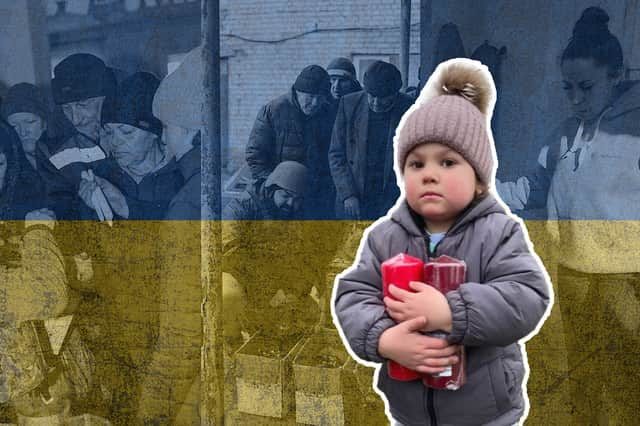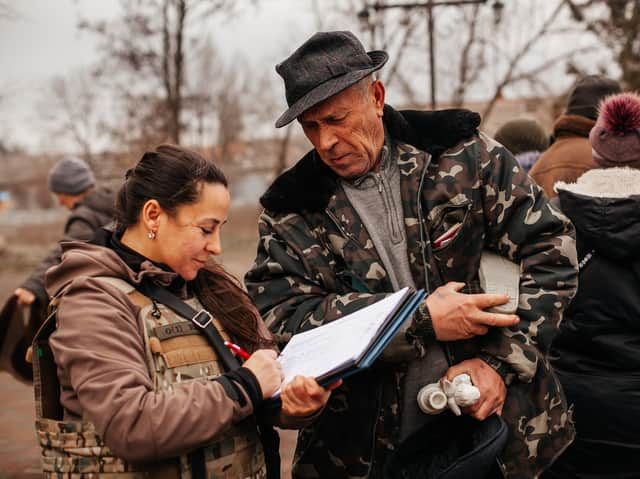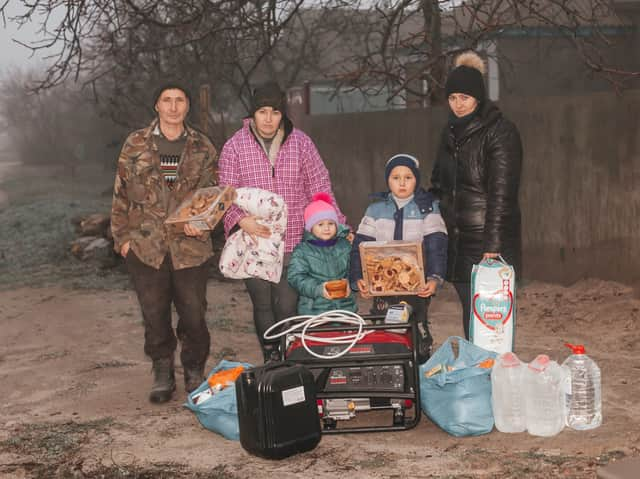I saw the fatigue of war in Ukraine - but also hope, creativity and extraordinary kindness


In the biting chill of a winter’s day in Odesa, I met one of the bravest women working on Ukraine’s frontline. Every week Alayna puts on her body armour and, with her colleagues from our partner charity, fills up a large van with humanitarian supplies. Weaving between bomb craters along muddy tracks, they head for recently liberated villages within range of Russian shelling.
Every trip is dangerous, but she has no hesitation in helping the villagers who are staying in their homes despite the fighting. Some because they want to, others because they can’t move due to poverty, old age or infirmity.
Advertisement
Hide AdAdvertisement
Hide AdThere are near misses, such as the time a Russian drone spotted the villagers crowding into an open space waiting for their delivery. Russian artillery opened fire, but the team and the villagers escaped unharmed.
Much of Christian Aid’s humanitarian work supports people in the aftermath of a crisis, or people who’ve been forced from their homes by war or natural disasters.
That was the picture during my first visit to Lviv, Western Ukraine, last July. Back then I met people who had fled the fighting in the East, and were crammed into temporary shelters, in university buildings, sports halls and other public spaces.
In the first phase of our response, meeting people’s most basic needs understandably dominated our work in Ukraine. Revisiting the country earlier this month, this time to the port city of Odesa, I could see how our programme has evolved.
Advertisement
Hide AdAdvertisement
Hide AdThanks to the solidarity and generosity of the British public, our support for Ukrainian people can go beyond the basics of food and shelter. The wrap-around services provided by our Ukranian partners felt more like a warm embrace for people struggling to cope with the trauma of war. Alongside the practical support given by community-based organisations , such as helping families to find housing and work, our partners are providing children a place to play and form new friendships, and giving parents an active role in designing and running projects.


Many of the volunteers I met had themselves been displaced. Actively responding to other people’s needs was clearly an important part of recovering from their own losses.
Forty-nine-year-old Olga, from Lyman, was working as a social worker in a women’s refuge I visited. She was there with her mother and has two grown-up children in Western Ukraine aged 30 and 22. She told me: “I received help, now I can give help.”
As part of this survivor-and community-led approach I saw an internal stairwell, identified as a priority by the community, that enables young children to continue lessons in a bomb shelter during air raid alerts. And in a centre for displaced people in the centre of Odesa, we’ve funded playground equipment that parents identified as a priority for their children.
Advertisement
Hide AdAdvertisement
Hide AdI was struck by the ways in which relatively small sums of money are making a tangible difference to people in urgent need. During recent winter months, we’ve funded winter kits - including stoves, solar lights and roofing material - for people in areas of Kherson that were under Russian occupation, and whose homes lack power and have been damaged by the fighting.
Working with another partner, we are able to support mobile clinics in Kharkiv, which go into insecure areas where the health system has been severely damaged, to provide consultations and prescriptions for people who otherwise would be unable to get access to medicines and treatment.
In meeting with Ukrainian people, the effects of the conflict are inescapable. Many of those I spoke with had experienced desperate conditions in cities under siege. One family of three generations, now living in a single rented room in an unlit Odesa tower block, had escaped from Mariupol after six weeks without power or running water.


The grandmother described to me how she had resorted to eating cat food in a neighbour’s abandoned apartment to stay alive, and had been fired at by Russian troops as she fled the city. She told me that she’d been given back some of her humanity through the support she and her family had received from our partner, Heritage Ukraine. She was so moved by the support shown by people in Britain who she has never met, that she insisted I try a large chocolate cake she’d baked for our visit.
Advertisement
Hide AdAdvertisement
Hide AdUkraine is a country suffering from the fatigue of war. The constant stress that comes from air raid alerts, family separation, power shortages and an economy in steep decline. Yet I also encountered vast reserves of hope, creativity, and determination in the face of adversity, channelled into some extraordinary work made possible by the kindness of strangers.
Patrick Watt is chief executive of Christian Aid
Comment Guidelines
National World encourages reader discussion on our stories. User feedback, insights and back-and-forth exchanges add a rich layer of context to reporting. Please review our Community Guidelines before commenting.
